Watch
Events
Articles
Market
More
Sabbath Keepers Fellowship & Prison Ministry
Min Hazaqen Torah Study Group on Facebook
Christi Banks
Yochanan Ben Yisrael
17 Yithro – Day 4
Sh’moth 19:1-6
In the third new moon after the children of Yisra’ěl had come out of the land of Mitsrayim, on this day they came to the Wilderness of Sinai.
For they set out from Rephiḏim, and had come to the Wilderness of Sinai, and camped in the wilderness. So Yisra’ěl camped there before the mountain.
And Mosheh went up to Elohim, and YHWH called to him from the mountain, saying, “This is what you are to say to the house of Ya‛aqoḇ, and declare to the children of Yisra’ěl: ‘You have seen what I did to the Mitsrites, and how I bore you on eagles’ wings and brought you to Myself.
‘And now, if you diligently obey My voice, and shall guard My covenant, then you shall be My treasured possession above all the peoples – for all the earth is Mine – ‘and you shall be to Me a kingdom of kohenim and a set-apart nation.’ Those are the words which you are to speak to the children of Yisra’ěl.”
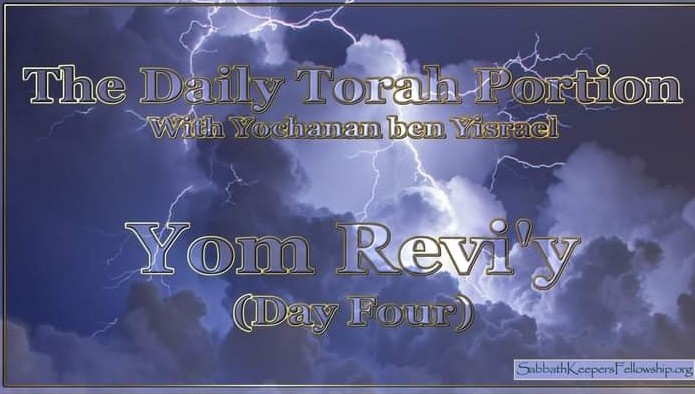



Sabbath Keepers Fellowship & Prison Ministry
Min Hazaqen Torah Study Group on Facebook
Christi Banks
Yochanan Ben Yisrael
Tehillah 94 - Day 4 (Yom Revi’y)
O YHWH, Ěl of vengeance; O Ěl of vengeance, shine forth!
Raise Yourself up, O Judge of the earth; Render punishment to the proud.
YHWH, how long are the wrong, How long are the wrong going to exult?
They pour forth words, They speak arrogantly; All the workers of wickedness boast in themselves.
They crush Your people, O YHWH, And they afflict Your inheritance.
They kill the widow and the stranger, And murder the fatherless.
Yet they say, “Yah does not see, And the Elohim of Ya‛aqoḇ pays no heed.”
Take heed, you senseless among the people; And you fools, when would you become wise?
He who planted the ear, does He not hear? He who formed the eye, does He not see?
He who disciplines the nations, Does He not reprove – The One teaching man knowledge?
YHWH knows the thoughts of man, That they are but a breath.
Blessed is the man You discipline, O Yah, And instruct out of Your Torah, To give him rest from the days of evil, Until the pit is dug for the wrong.
For YHWH does not leave His people, Nor does He forsake His inheritance.
For judgment returns man to righteousness, And all the upright in heart follow it.
Who would rise up for me against evil-doers? Who would stand up for me against workers of wickedness?
If YHWH had not been my help, My being would soon have settled in silence.
When I said, “My foot has slipped,” Your mercy, O YHWH, supported me.
When anxiety was great within me, Your comforts delighted my being.
Would a throne of destruction, Which devises trouble by law, Be joined with You?
They band together against the life of the righteous, And declare innocent blood wrong.
But YHWH is my defense, And my Elohim the rock of my refuge, And brings back on them their own wickedness, And cuts them off in their own wrongdoing; YHWH our Elohim does cut them off.
Come, let us sing to YHWH! Let us raise a shout to the Rock of our deliverance.
Let us come before His face with thanksgiving; Let us raise a shout to Him in song.
For YHWH is a great Ěl, And a great King above all mighty ones.
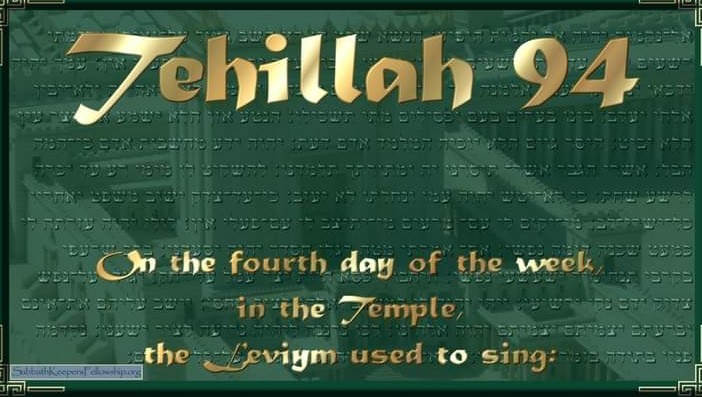



Sabbath Keepers Fellowship & Prison Ministry
Min Hazaqen Torah Study Group on Facebook
Christi Banks
Yochanan Ben Yisrael
FROM THIS WEEK'S TORAH PORTION:
"And it came to be, on the third day in the morning, that there were thunders and lightnings, and a thick cloud on the mountain. And the voice of a shophar was very strong, and all the people who were in the camp trembled. And Moshe brought the people out of the camp to meet with Elohim, and they stood at the foot of the mountain."
It is interesting to note that the Hebrew word in this passage, translated into English as "at the foot of," is "tachat." Normally, this word is translated as "under," or "underneath." Some scholars suppose that this encounter between YHWH and His people was something of a 'shotgun wedding,' and that YHWH was holding the mountain over the people's heads as He awaited their answer to His proposal of marriage. That answer was then quite predictable:
"And Moshe came and called for the elders of the people and set before them all these words which YHWH commanded him. And all the people answered together and said, ‘All that YHWH has spoken we shall do.’"?
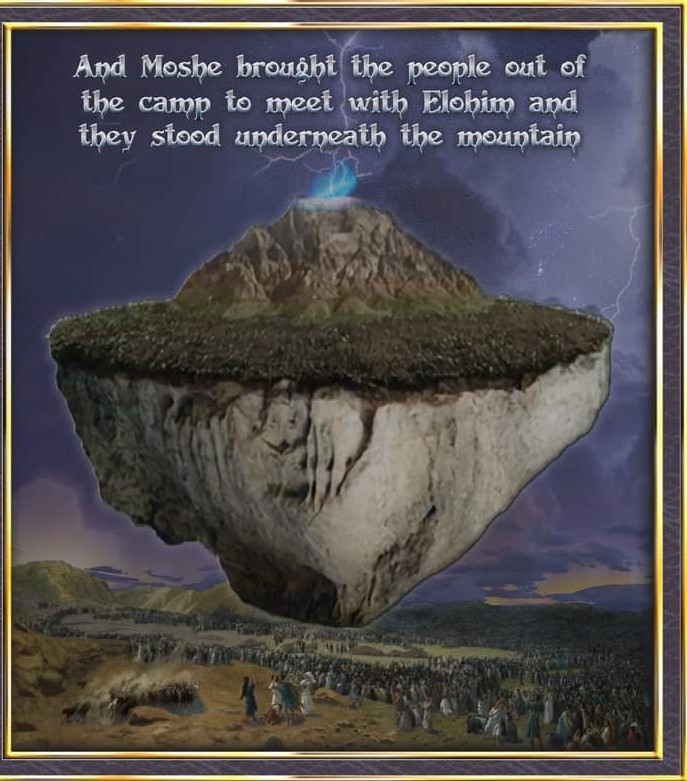



Sabbath Keepers Fellowship & Prison Ministry
Min Hazaqen Torah Study Group on Facebook
Christi Banks
Yochanan Ben Yisrael
From this week's Torah portion:
The scriptures are a love story. They are a tale of a special people whom the Master of the universes chooses and calls out for Himself as a bride. It is written in the Prophets:
"Therefore, see, I am alluring her and shall lead her into the wilderness and shall speak to her heart and give to her the vineyards from there and the valley of Akor as a door of hope. And there she shall respond as in the days of her youth, as in the day when she came up from the land of Mitzrayim. And it shall be in that day, declares YHWH, that you shall call Me Ishi (my husband) and no longer call Me Ba’aliy (my lord)..."
The 10 commands which are given is this week's Torah portion are the "Kethuvah," the wedding contract between YHWH and His bride Yisrael. Scripture says this kethuvah was made not only with those who were standing there that day and near, but also those of Yisrael who were not standing there that day and afar off. Such is the great love between YHWH and His bride that she accepted it before she even heard it in its entirety, saying "All that YHWH has spoken, we will do."
What about you? Do you accept YHWH's Torah upon yourself in its entirety and agree to obey the wedding contract of your Maker - your Husband-to-be? If you do, He has this to say to you:
...and I will betroth thee unto Me forever; yea, I will betroth thee unto Me in righteousness, and judgment, and in lovingkindness and in mercy; and I will betroth thee unto Me in faithfulness; and thou shalt know YHWH.”
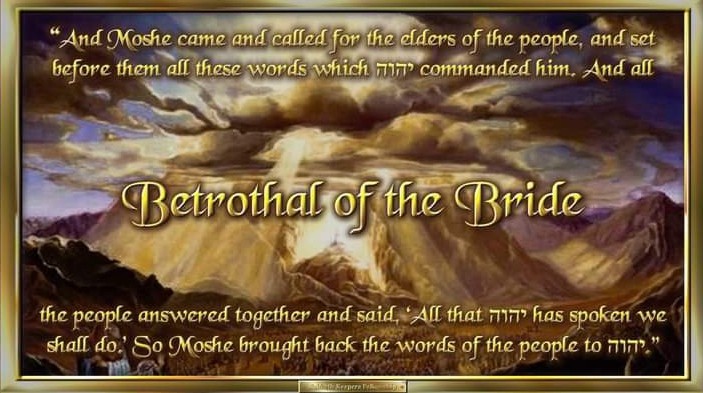



Sabbath Keepers Fellowship & Prison Ministry
Min Hazaqen Torah Study Group on Facebook
Christi Banks
Yochanan Ben Yisrael
From this week's Torah portion:
“And Elohim spoke all these Words, saying, ‘I am YHWH your Elohim, who brought you out of the land of Mitsrayim, out of the house of slavery.
You have no other mighty ones against My face.
You do not make for yourself a carved image, or any likeness of that which is in the heavens above, or which is in the earth beneath, or which is in the waters under the earth, you do not bow down to them nor serve them. For I, YHWH your Elohim am a jealous Ěl, visiting the crookedness of the fathers on the children to the third and fourth generations of those who hate Me, but showing mercy to thousands, to those who love Me and guard My commands.
You do not bring the Name of YHWH your Elohim to naught, for YHWH does not leave the one unpunished who brings His Name to naught.
Remember the Sabbath day, to set it apart. Six days you labor, and shall do all your work, but the seventh day is a Sabbath of YHWH your Elohim. You do not do any work – you, nor your son, nor your daughter, nor your male servant, nor your female servant, nor your cattle, nor your stranger who is within your gates. For in six days YHWH made the heavens and the earth, the sea, and all that is in them, and rested the seventh day. Therefore, YHWH blessed the Sabbath day and set it apart.
Respect your father and your mother, so that your days are prolonged upon the soil which YHWH your Elohim is giving you.
You do not murder.
You do not commit adultery.
You do not steal.
You do not bear false witness against your neighbor.
You do not covet your neighbor’s house, you do not covet your neighbor’s wife, nor his male servant, nor his female servant, nor his ox, nor his donkey, or whatever belongs to your neighbor.’”
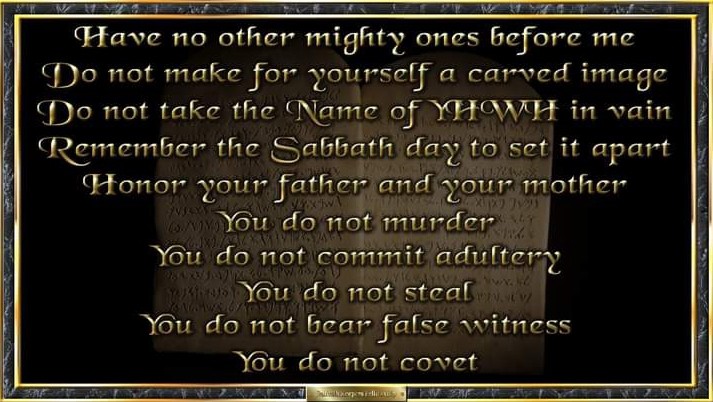



What do sliverists do if they live in a place like Seattle, WA? It rainsmost of the time there. Rain means clouds. Clouds mean a moon can't be sighted. They would have very few, very long months!
#moedim


